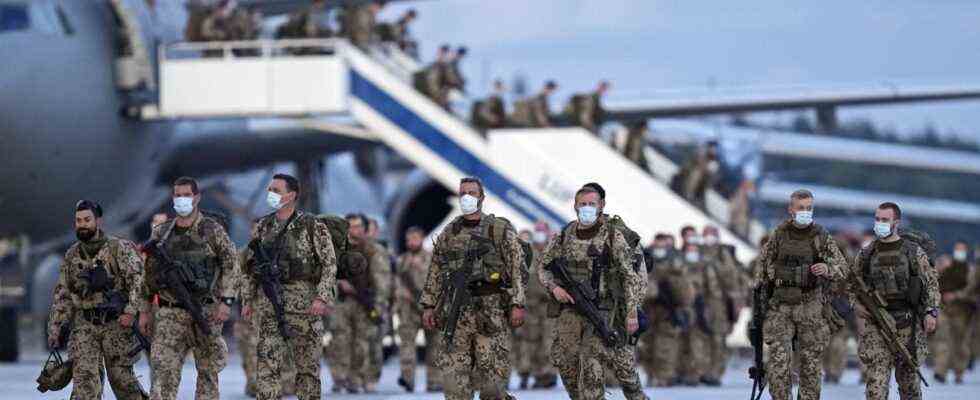It is 7:58 p.m. when the first one A400M-Military transporter moving towards the parking position. The four turboprop engines make a deafening noise. The tailgate opens. Little by little, the soldiers in their riot gear leave the plane, rifle in hand. The tension of the past two weeks can be seen in their faces. Applause breaks out from relatives and comrades.
It went well again. But it was close. The last machines from Kabul started on Thursday shortly after a bomb exploded there and terrorists shot at the airport.
The Wunstorf Air Base, near Hanover. Friday evening. One of the most dangerous missions of the Bundeswehr, the evacuation operation from Kabul, comes to an end. The soldiers come back.
A little later they appear in a maintenance hall for the returnees roll call. The commander of the operational command, Lieutenant General Erich Pfeffer, says: “Today is no reason to celebrate in view of the dramatic situation in Afghanistan.” But, it was a day to be happy about the return, to appreciate the achievements of the soldiers. Defense Minister Annegret Kramp-Karrenbauer (CDU) did this: The soldiers had “seen the unbelievable and achieved the unbelievable”.
Politics is big this time
For the soldiers, the effort was extreme. Sleeping on the floor, if you could even talk about sleep. They overheard a firefight and ventured out into the night to fetch those in need of protection. And yet they had to leave many behind in the country who had hoped for their help. Brigadier General Jens Arlt, who led the operation in Kabul, says that he has not seen anything like it up to now.
The last stage for the soldiers, back from the temporary hub in Tashkent to Germany, was covered by Minister Kramp-Karrenbauer on Friday with the troops on the plane.
She shouldn’t make a mistake like that on June 30th again. At that time, none of the leading federal politicians was there when the last 264 soldiers from the Afghanistan mission landed in Wunstorf. After almost 20 years, the Bundeswehr’s most loss-making and most strenuous mission, with 59 fallen soldiers, ended with their arrival. At least that’s what they thought at the time. Kramp-Karrenbauer was there in the USA, and other politicians also had appointments.
During these two decades, a situation prevailed which the former Federal President Horst Köhler described in 2005 as a “friendly disinterest” of the Germans in their Bundeswehr. On this June day, the soldiers got to feel with full force what Koehler meant.
The Bundeswehr would not have been able to do that five years ago
Wunstorf, two months later. The clouds hang low. Politicians rarely get the opportunity to correct a mistake so quickly. The defense politicians from the Bundestag are on the sidelines, almost a dozen MPs have come. Eva Högl, the Bundestag’s defense commissioner, was already there in Tashkent. Kramp-Karrenbauer wanted politics to make it big today.
Since August 16, the Bundeswehr has been with A400M-Transport aircraft built an airlift to Kabul. The Bundeswehr has made 37 flights since then, and in doing so has brought 5,347 people out of Kabul – Germans, Afghans, citizens of other countries. It was also about rescuing as many Afghan aid workers as possible who had worked for German institutions and feared for their lives after the Taliban came to power. The government and parliament had sent the Bundeswehr into combat with airplanes, helicopters and 600 men and women.
The defense commissioner Högl said that day that the soldiers “literally gave everything up to the last minute”.
One could also say: The Bundeswehr, which had to endure scorn and ridicule so often, worked. In a way, it is even the year of the Bundeswehr: first the administrative assistance in the Corona crisis, when thousands of soldiers made bread in the nursing home and helped out in health departments. Then the help after the flood with evacuation armor and makeshift bridges. Now the rescue flights from Afghanistan.
Just five years ago, the Bundeswehr would not have been able to achieve such a powerful airlift, simply because it needed operational modern ones A400M would have been missing. The Special Forces Command (KSK) was able to show in at least four operations in Kabul why Germany has this special forces association. Brigadier General Jens Arlt, the operations leader, asks for time to deal with everything. “The commitment will shape us all.”

